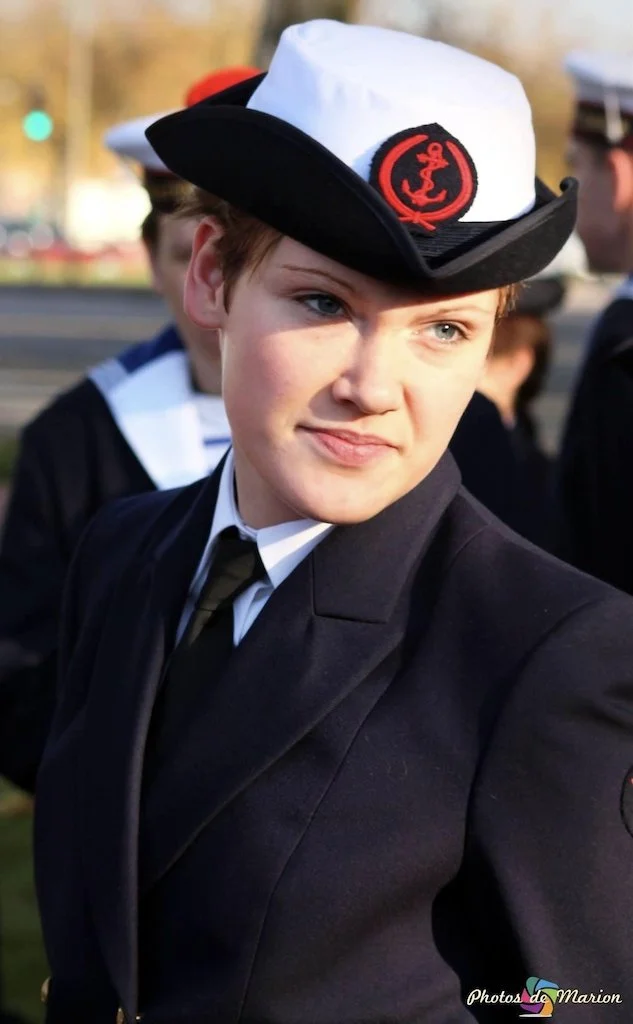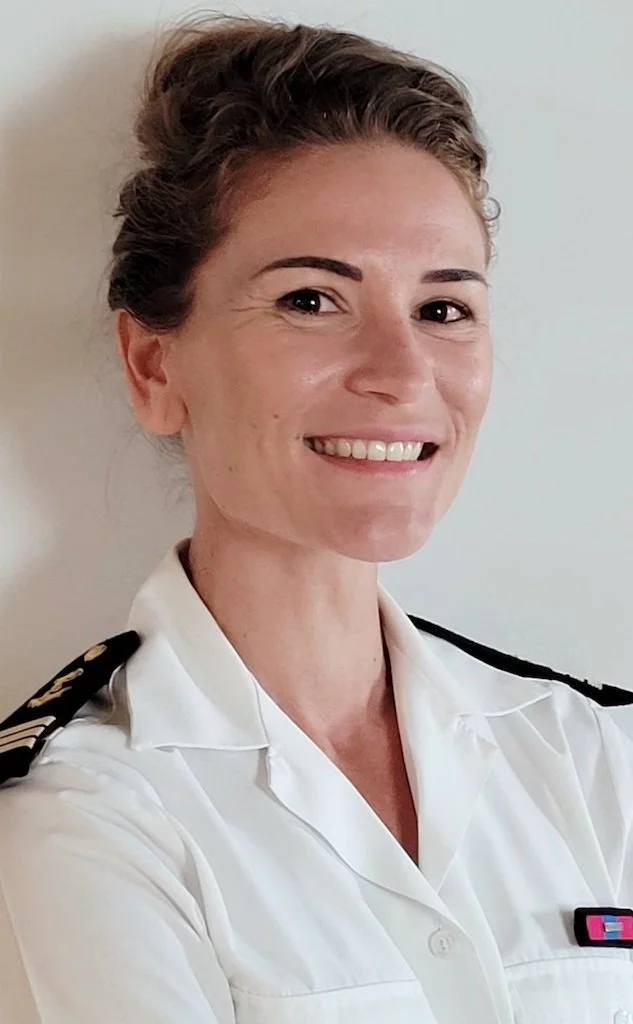Petty Officer Honorine
Honorine
By the time she turns 28, Honorine will already have 10 years of professional experience under her belt, enough to easily find work in the civilian world when her contract with the French Navy ends.
Pragmatic, this bubbly young mother of a two-year-old boy, already knows that she’ll be leaving the institution in 2026. “In the Navy we are transferred every three years. My husband is also in the Navy, so we decided that with a child it was preferable for one of us to leave. When my contract expires he’ll have totted up 17 years in the military and three years later he can retire on a full pension. So it makes sense for him to carry on and for me to stop.”
Either way, she's already fulfilled her ambition. “My three year assignment aboard the Charles de Gaulle aircraft carrier was the pinnacle of my ambition when I joined the Navy,” she says.
Honorine, who doesn’t beat around the bush, easily admits that she also no longer needs the rigorous framework of a military life.
““when you’re a woman in the military, you have to have the sort of personality that won’t allow you to be pushed around””
“At the age of 15 I was in the midst of a teenage crisis. I rejected parental authority and because I was never very academic, my secondary studies were going badly. I needed rigour, someone to give me a framework. So the headmaster, a former soldier, directed me towards a military career.”
Honorine enrolled in an electronics professional baccalaureate. At the same time, three Saturdays a month, she undertook naval training where her main teacher, in the reserves, took her in hand. "I realised that the mentality I found there corresponded to my own.” While continuing studying for her baccalaureate, Honorine nevertheless changed schools so that she could undertake all her internships in a naval environment.
“This background helped me get into the École de Maistrance [the naval training school for non-commissioned officers] because it demonstrated a certain obsession on my part regarding the Navy,” she explains.
Not very keen on sports - which she nevertheless prefers in a team - she admits that she has played football. "But I'm not one to get up early to go for a jog,” she laughs.
Honorine obtained her BAT (technical aptitude certificate) as an aeronautical electronics engineer and then took a qualifying internship in weaponry "because I found it a shame to be in the army and do a job that I could do in civilian life. This job is clearly not a civilian job.” She was then an aeronautical gunsmith.
Immediately after her BAT, Honorine was assigned to the Charles de Gaulle for three years. But that doesn't mean she was at sea the whole time. "Oh, no, when the carrier went on a mission I was aboard but when it was docked I just went aboard every day and came home in the evenings.”
Honorine was the only woman in the three teams of about 10 people each who dealt with the weapons carried by the Rafale fighter jets. “If I simplify a lot, a missile is like a piece of Ikea furniture: it comes in parts that you have to assemble and if it hasn't been used, then you take it to bits again when the aircraft returns from its mission. We, the aeronautical gunsmiths, were also responsible for the Rafale’s weapons’ attachement systems, that is the systems which allow the missiles to be attached under the wings of the plane or under its belly. This involves working from 03:00 to 11:00. and then from 18:00 to 03:00 every third day. The other two days we worked in the workshop.”
Honorine remarks that “when you’re a woman in the military, you have to have the sort of personality that won’t allow you to be pushed around. You set limits; after that there’s no problem.”
Meanwhile Honorine was learning her way around the largest vessel in the French Navy.
She’s come away full of anecdotes. She recounts that in order to be able to fold her 1.80m (5ft 9 inch) tall frame into her top bunk "I had to remove a section of the ceiling to be able to sleep!”
She discovered India and Singapore (too modern for her taste) but her favourite was Djibouti. “I went to a hairdresser who suggested I take a tour of the city. At one point we stopped so I could buy a drink so naturally I bought one for the driver too. So, to thank me, he invited me to eat with his family. They are people who have nothing but who offer you everything,” she says, still moved by their kindness.
Honorine and a colleague working on safety equipment. Photo credit: French Navy
About 2,000 people work on the Charles de Gaulle. One of them became Honorine’s spouse! A few months after her last mission aboard the aircraft carrier, she became pregnant. “Pregnant women are immediately disembarked from the ship as it’s considered dangerous both for them and their child. I had a complicated pregnancy so I was given office jobs.”
Today Honorine takes care of “all lifesaving and survival equipment such as vests, lifeboats and life rafts and so on. I maintain them, I repair them, I even do some sewing!”





